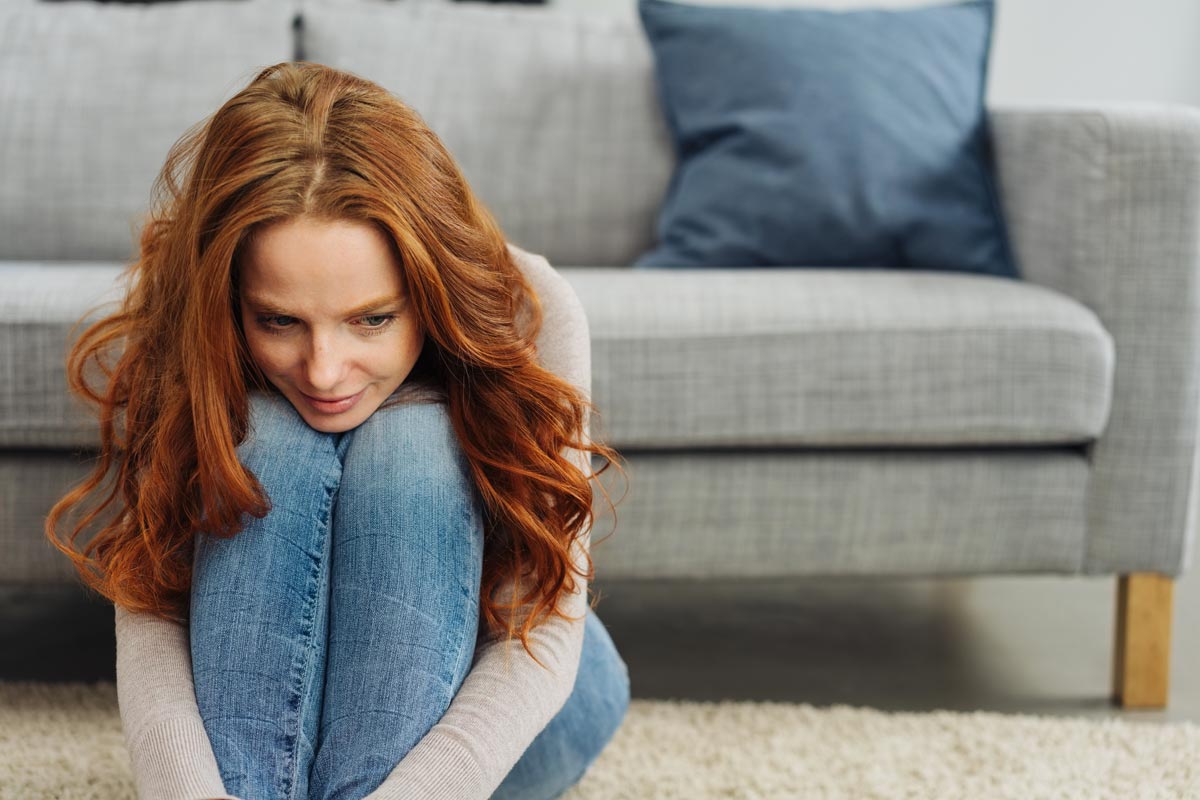 Anxiety is one of the most common disorders in the United States. With some 40 million Americans struggling with some form of anxiety, the disorder affects more than 3% of the population. Yet, less than 35% of us ever seek out treatment. Despite that, anxiety is a highly treatable disorder, and tactics like cognitive behavioral therapy, mindfulness-based stress-reduction therapy, and other behavioral therapies can have a significant impact on quality of life. Therefore, it’s always important to seek out a doctor and then treatment. Often, anxiety treatment will require medication. However, that medication is normally temporary, helping to alleviate the worst of the symptoms so you can get back on your feet and learn coping mechanisms. In other cases, you might not be able to take or use medication, might not need medication with your symptoms, and might want to try (with the advice of your doctor) to cope without medication.
Anxiety is one of the most common disorders in the United States. With some 40 million Americans struggling with some form of anxiety, the disorder affects more than 3% of the population. Yet, less than 35% of us ever seek out treatment. Despite that, anxiety is a highly treatable disorder, and tactics like cognitive behavioral therapy, mindfulness-based stress-reduction therapy, and other behavioral therapies can have a significant impact on quality of life. Therefore, it’s always important to seek out a doctor and then treatment. Often, anxiety treatment will require medication. However, that medication is normally temporary, helping to alleviate the worst of the symptoms so you can get back on your feet and learn coping mechanisms. In other cases, you might not be able to take or use medication, might not need medication with your symptoms, and might want to try (with the advice of your doctor) to cope without medication.
If so, there are plenty of paths you can take. Most of them involve going to therapy, learning good coping skills, and building behavior patterns that reduce anxiety as much as possible. 7 of the most helpful ways to cope with anxiety naturally include:
Professional Therapy
It’s important to go to a doctor as the first step in any treatment plan. Anxiety overlaps with thyroid disorders, nutritional deficiencies, substance use disorders, and other serious health problems. You cannot self-diagnose, although an anxiety self-test may help you see if you have any anxiety symptoms. If you’ve already been diagnosed with anxiety, you still might want to go to a professional therapist to get a new assessment and recommendation.
Additionally, modern anxiety treatment normally uses medication as a last resort. If you don’t respond well to behavioral therapy, you’ll likely be recommended to medication. However, that normally involves 3-6 months of therapy first. Behavioral therapy offers an approach that helps you to reduce the impact of anxiety by changing how you respond to anxious thoughts. This can mean learning how to stop and get out of negative thought patterns, learning how to break off downward spirals, learning how to distract yourself when you feel anxiety, and examining and understanding underlying problems and patterns. Eventually, therapy should work to teach you skills that reduce the impact of anxiety long-term, however, many people need consistent follow-ups and ongoing therapy at touchpoints throughout their lives.
Identify Triggers
Understanding what triggers anxiety (and if possible, why) is a powerful step to coping with anxiety. Triggers are items which set off anxious thoughts or cycles. For example, you might be triggered by people criticizing you, by having chores, by traffic, etc. Triggers are complex and not always directly related to what you end up being anxious about. Sometimes, there is no real reason. Sometimes, you’re anxious because you’re afraid of being anxious.
Sitting down with a therapist or with yourself and working to identify what triggers are can be freeing. It also means you can prepare to be triggered when those things come up. If you walk into cleaning up a mess going, “I know I get triggered by this and here’s how I’m going to cope”, you’re already prepared. Of course, the important thing there is to prevent that foreknowledge of triggers to result in more anxiety.
Exercise
If your anxiety is very bad, it will likely get in the way of being able to exercise. If you have things enough under control, exercise can be a very good treatment for anxiety. In fact, exercise is often prescribed in clinical settings. Why? Regular exercise increases endorphin production, meaning your body naturally produces more of the dopamine and serotonin you need to overcome anxiety. It also means increased blood oxygenation, which boosts mood and energy levels. Exercise can also help shift your attention, pulling you out of downward spirals and anxious thoughts.
However, you don’t have to spend hours at the gym to see benefits. Most doctors recommend 30-60 minutes of light to moderate exercise, 5+ days per week. That means a light workout at the gym, cycling, swimming, walking, or light jogging. You don’t have to be exhausted; you don’t have to lose or gain weight; you just have to move. Building good exercise habits can be difficult, especially at first. Therefore, it’s always a good idea to try for exercise that’s fun. Dancing, swimming, and yoga for addiction recovery are popular choices for that.
Be Brave. Get Help.
We know what it’s like to have a new chance at life. We want you to feel that, too.
Call us: 1 954-688-5806
Eat Well
 Did you know that nutrition plays a large part in anxiety and mood? Some nutrient deficiencies can even mimic anxiety. Good nutrition helps to balance the mood, balance your energy levels, and gives you a healthy basis with which to recover from. If you do have a nutritional deficiency, it’s important to see a nutritionist for specialized advice. Otherwise, you can follow regular dietary advice, use the daily guidelines, and make sure that roughly 80% of your food is healthy. While this will take months to take effect, it does help.
Did you know that nutrition plays a large part in anxiety and mood? Some nutrient deficiencies can even mimic anxiety. Good nutrition helps to balance the mood, balance your energy levels, and gives you a healthy basis with which to recover from. If you do have a nutritional deficiency, it’s important to see a nutritionist for specialized advice. Otherwise, you can follow regular dietary advice, use the daily guidelines, and make sure that roughly 80% of your food is healthy. While this will take months to take effect, it does help.
Learn Stress Management
Stress management is one of the single most powerful ways to cope with anxiety naturally. At the same time, there are hundreds of tactics to do so. Some, like mindfulness, mindfulness-based stress reduction, stress management courses, etc., are very formal. They’re also often recommended either as part of primary therapy for anxiety or as complimentary therapy for it. Practices like mindfulness are highly beneficial for persons with anxiety because they teach you to get out of thought loops and to spend more time experiencing rather than thinking.
At the same time, relying entirely on formal techniques is a mistake. Good habits help you release and reduce stress. For example, building good time management, keeping your home clean, taking time out to de stress, building good communication habits with your friends and family, taking on work and responsibilities in manageable ways, and managing expectations.
It also means taking care of yourself. For example, if you don’t get enough sleep, you will be stressed. Not getting enough sleep changes how your body produces and absorbs endorphins, which means getting too little or too much (less than 7 or more than 9 hours) sleep in a night can mess with your mood and increase anxiety. Building good habits, like going to bed at the same time every day, turning off devices an hour before bed, or meditating or reading before bed can greatly improve sleep if you struggle with getting enough of it.
Organize Your Life
Organizing your home, office, and life is an easy way to reduce stress in your daily life. More things means more to worry about, more to stress about, and more to keep track of. Taking time to organize spaces, get rid of things you don’t need, remove habits and hobbies you don’t want or need from your life, and otherwise making life easier on yourself is important for coping with anxiety long-term. This can mean taking 15 minutes every morning to clean up and organize, it can mean organizing your schedule to reduce stress, and it can mean finding better ways to do things that might stress you out.
Take Time Out
Managing anxiety can be a lot of work. It can mean taking on hobbies, committing to exercise, setting aside time to clean, going to therapy. It’s also important to take time out to do nothing. Relax, calm down, and just do nothing. That can be difficult in and of itself. It’s hard not to take downtime to clean, or to pick up after kids, or do chores. Taking time to do nothing might mean reading a book, sitting in the bath with music, watching your favorite show, etc. But, making time to just relax and do nothing should be an important part of your daily routine. That’s especially true if you normally guilt yourself for taking time out or struggle to make yourself do things. Planning time for that gives you space to learn how to relax without the guilt, so you can actually relax.
For many of us, anxiety isn’t going away. You might need medication to manage it. You might be able to cope with symptoms with therapy and good habits. Either way, it’s important that you see a therapist, get advice, and work for long-term health. Good luck.
If you or your loved one have questions about dual diagnosis treatment, please contact Laguna Shores today. We are here to support you. Reaching out for help with addiction and mental health challenges takes courage – but you can do it.

 Matthew Beck B.A, M.A, LMFT
Matthew Beck B.A, M.A, LMFT 



For my thesis, I consulted a lot of information, read your article made me feel a lot, benefited me a lot from it, thank you for your help. Thanks!
Very nice post. I just stumbled upon your blog and wanted to say that I’ve really enjoyed browsing your blog posts. In any case I’ll be subscribing to your feed and I hope you write again soon!